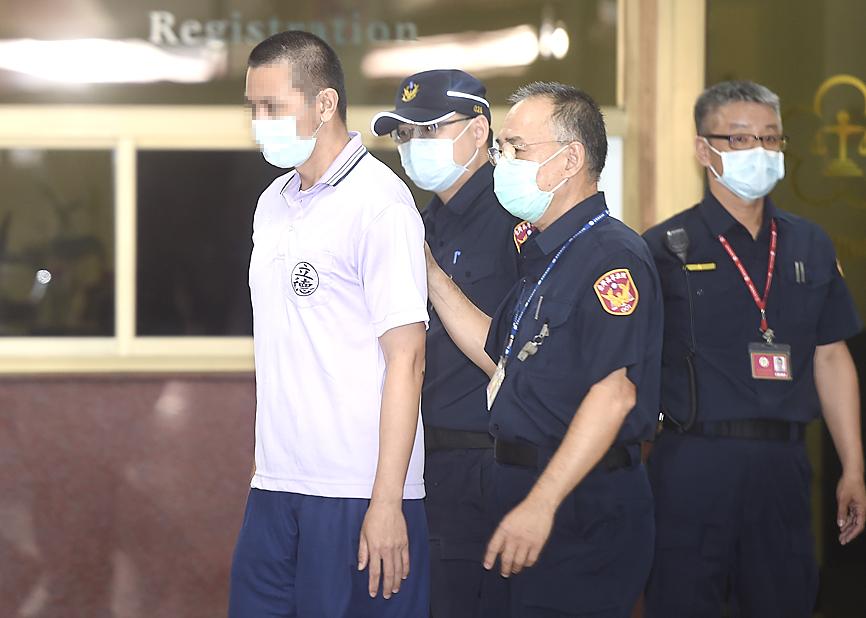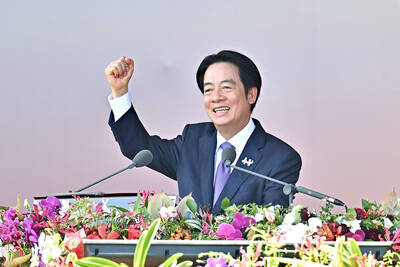The High Court yesterday acquitted a man who was convicted of decapitating his mother in Taoyuan in 2018, reversing an earlier life sentence and sparking criticism.
High Court spokesman Wang Ping-hsia (王屏夏) said the judges had considered Liang Tsung-ming’s (梁崇銘) state of mind in reversing the original ruling, saying that he was not in control of his actions at the time of the incident, due to drug-induced psychosis.
Wang cited Article 19 of the Criminal Code, which states that “an offense is not punishable” if the person who committed it has a mental disorder or disability that renders them “unable or less able to judge” their actions.

Photo: Chien Jung-fong, Taipei Times
The Taiwan High Prosecutors’ Office yesterday said it would appeal the High Court’s ruling.
Prosecutors last year had requested “the most severe punishment” for Liang, 35, who in September last year was convicted of murder.
On Oct. 17, 2018, Liang stabbed his 67-year-old mother several times after an argument, cut off her head and left hand, and threw the head from their 12th-floor apartment in Taoyuan’s Jhongli District (中壢) into a courtyard below, police said at the time.
Wang said Liang was released immediately yesterday, but that he requires treatment and close monitoring. The court asked the Taoyuan Department of Public Health to evaluate Liang’s condition to determine whether he can return to his residence.
However, as Liang was being escorted to a Taoyuan hospital for an evaluation yesterday, he was placed under arrest to serve a 55-day sentence related to a assault case in April 2018, police said.
Some people have criticized the latest High Court ruling, calling the judges “dinosaurs” for allowing Liang to walk free, and that other killers could also claim they had been on drugs to avoid a life sentence.
“This High Court decision does not reflect the public’s understanding [of the law] and expectations... I think many people would have trouble accepting this ruling,” Taoyuan Mayor Cheng Wen-tsang (鄭文燦) said.
“This case should have required mandatory treatment for the defendant,” Cheng said. “However, the procedure outlined in the ruling requires a psychiatric evaluation at a certified hospital, and then Taoyuan public health authorities have to take Liang to a medical clinic for another assessment to decide on follow-up care.”
Such a ruling might cause a misunderstanding or even an “imitation effect,” Minister of Justice Tsai Ching-hsiang (蔡清祥) said.
Tsai pointed to the case of a man surnamed Cheng (鄭), who stabbed and killed a railway police officer and was acquitted in April because of a mental disorder.
Criminals should not think they can escape legal penalties if they lose control due to the effects of alcohol or drugs, the minister added.
Additional reporting by CNA

The Ministry of the Interior (MOI) is to tighten rules for candidates running for public office, requiring them to declare that they do not hold a Chinese household registration or passport, and that they possess no other foreign citizenship. The requirement was set out in a draft amendment to the Enforcement Rules of the Public Officials Election and Recall Act (公職人員選舉罷免法 ) released by the ministry on Thursday. Under the proposal, candidates would need to make the declaration when submitting their registration forms, which would be published in the official election bulletin. The move follows the removal of several elected officials who were

FOUR DESIGNATED AREAS: Notices were issued for live-fire exercises in waters south and northwest of Penghu, northeast of Keelung and west of Kaohsiung, they said The military is planning three major annual exercises across the army, navy and air force this month, with the navy’s “Hai Chiang” (海強, “Sea Strong”) drills running from today through Thursday, the Ministry of National Defense said yesterday. The Hai Chiang exercise, which is to take place in waters surrounding Taiwan, would feature P-3C Orion maritime patrol aircraft and S-70C anti-submarine helicopters, the ministry said, adding that the drills aim to bolster the nation’s offshore defensive capabilities. China has intensified military and psychological pressure against Taiwan, repeatedly sending warplanes and vessels into areas near the nation’s air defense identification zone and across

SENATE RECOMMENDATION: The National Defense Authorization Act encourages the US secretary of defense to invite Taiwan’s navy to participate in the exercises in Hawaii The US Senate on Thursday last week passed the National Defense Authorization Act (NDAA) for Fiscal Year 2026, which strongly encourages the US secretary of defense to invite Taiwan’s naval forces to participate in the Rim of the Pacific (RIMPAC) exercise, as well as allocating military aid of US$1 billion for Taiwan. The bill, which authorizes appropriations for the military activities of the US Department of Defense, military construction and other purposes, passed with 77 votes in support and 20 against. While the NDAA authorizes about US$925 billion of defense spending, the Central News Agency yesterday reported that an aide of US

NATIONAL DAY: The ‘Taiwan Dome’ would form the centerpiece of new efforts to bolster air defense and be modeled after Israel’s ‘Iron Dome,’ sources said President William Lai (賴清德) yesterday pledged to strengthen the nation’s air defense capabilities and build a “T-Dome” system to create a safety net against growing military threats from China. “We will accelerate our building of the T-Dome, establish a rigorous air defense system in Taiwan with multi-layered defense, high-level detection and effective interception, and weave a safety net for Taiwan to protect the lives and property of citizens,” he said in his National Day address. In his keynote address marking the Republic of China’s (ROC) 114th anniversary, Lai said the lessons of World War II have taught nations worldwide “to ensure that